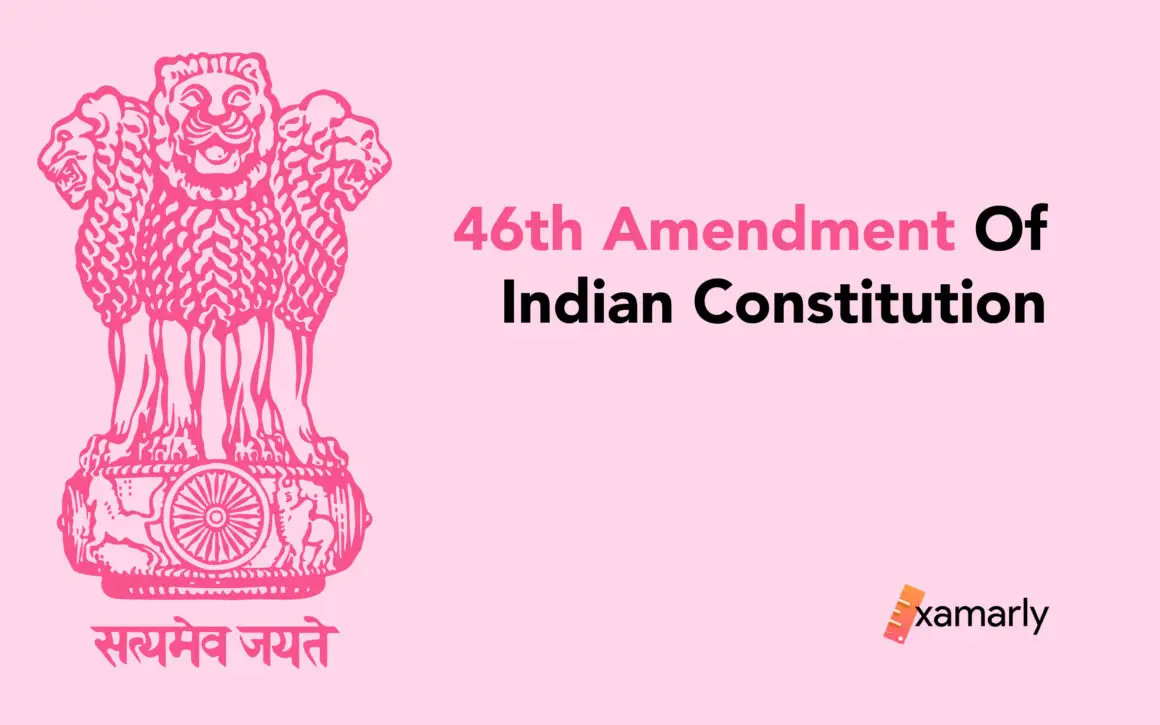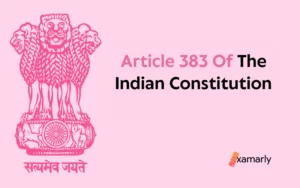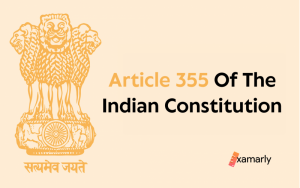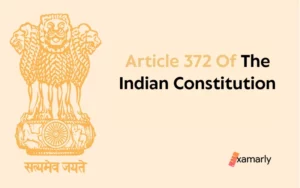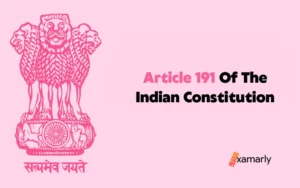The Constitution (Forty-sixth Amendment) Act, 1982 is the formal name of 46th Amendment of Indian constitution. The amendment’s goal was to counteract judicial rulings on the reach and applicability of the sales tax.
Read this article further to learn more about the changes done by the 46th amendment of the Indian Constitution. Also, you will understand the reason behind the need for such amendment and much more information. This will be worth reading for you if you are preparing for a competitive examination like UPSC. This is included in the Indian Polity of UPSC Syllabus.
The Constitution’s 46th Amendment Act of 1982
On 2 February 1983, the forty-sixth amendment came into effect. This amendment modifies articles 269, 286, and 366 and schedule 7 of the Indian Constitution. When this amendment was passed, Indira Gandhi was the prime minister. In the 33rd year of the Republic of India, this amendment was approved.
This amendment gave the states authority to tackle tax avoidance in a variety of ways. It assigned the states the responsibility of collecting the tax that is imposed on the consignment of commodities at the place where interstate trade or commerce is conducted.
Restrictions and conditions with respect to the method of the levy, rates, and other aspects of the tax on the delivery of goods under a hire-purchase agreement or under any other system of payment in installments, as well as on the authority to use any goods, that are specific to the implementation of a works contract.
Objects And Reasons
1) Based on the principle that entries in the legislative lists should be interpreted broadly, sales tax laws passed in conformance with the Government of India Act of 1935 and those passed after the Constitution came into effect both assumed that the phrase “sale of goods” would be given a wider connotation.
The Supreme Court, however, determined that the term “selling of goods” as used in the entries in the Seventh Schedule to the Constitution had the same meaning as in the Sale of Goods Act, 1930 in Gannon Dunkerley’s case (A.I.R. 1958 S.C. 560). This choice concerned work agreements.
2)The Supreme Court has determined in a succession of subsequent decisions that a variety of additional transactions that substantially resemble transactions by way of sales are not subject to sales tax based on its ruling in the Gannon Dunkerley case.
Following these rulings, a transaction must contain the following components in order to be subject to the levy of sales tax under entry 92A of the Union List or entry 54 of the State List. These include things like parties competent to contract, shared consent, and the transfer of property in products from one party to the contract to the other for a price.
3)This role has created opportunities for tax avoidance through a variety of means. Inter-State consignment transfers are one instance of this. In order to avoid payment of sales tax on interstate sales as required by the Central Sales Tax Act, this requires the product to be transferred from a principal’s office, branch, or broker in one State to another State, or vice versa, or the transfer of goods on a consignment account. While under a works contract, if the cost of the labor is treated differently from the sale of the materials, the sale of the supplies would be subject to tax. However, it is not possible to charge sales tax on the transfer of property in the products involved in the performance of an indivisible works contract. This is because it has been determined that neither the materials themselves nor the property contained within them is sold and transferred as moveable. Although the buyer technically receives the items on the hire-purchase date in a hire-purchase arrangement, it has been ruled that a sale only takes place when the buyer chooses to purchase the things at a far later date.
As a result, only the reduced worth of the commodities included in the deal at the moment the opportunity to purchase is executed is liable for sales tax. Similar to how sales made by a registered club or other association of persons to their members (the club or association of persons having corporate status) are taxable, sales made to members of an unincorporated club or association of persons are not taxable. This is because, according to law, the club or organization does not exist apart from its members. The Supreme Court ruled in the Associated Hotels of India case (A.I.R. 1972 S.C. 1131) that there is no sale taking place when a hotelier provides food or drink to a person who is staying at the hotel.
4)According to the Supreme Court’s ruling in the New India Sugar Mills case (A.I.R. 1963 S.C. 1207), there is no requirement for mutual assent or the seller’s desire when controlled commodities are transferred in accordance with a Control Order’s directive. According to the Sale of Goods Act of 1930, there was therefore no sale. However, the Supreme Court had the opportunity to evaluate its earlier decisions regarding the liability of transfers of restricted commodities to be charged with sales tax in Oil and Natural Gas Commission Vs. State of Bihar (A.I.R. 1976 S.C. 2478). The Supreme Court concluded that in situations where there are any legislative requirements, the legislature itself should be seen as supplying the consensus and giving the consensus’s modality. In the case, Vishnu Agencies v. Commercial Tax Officer (A.I.R. 1978 S.C. 449), six of the seven judges concurred in over-ruling the decision in the New India Sugar Mills case. The seventh judge, however, thought the case may be distinguished. Therefore, it is deemed desirable to remove all ambiguity from the situation.
5)The Law Commission of India was consulted over a number of issues relating to the Central Sales Tax Act, 1956, as well as the States’ ability to collect a tax on the sale of commodities. These issues were taken into account by the Commission in its sixty-first Report. They urged, among other things, that the Constitution be changed if it were determined to impose taxes on the kinds of transactions mentioned in the previous paragraphs.
6) By using the strategy of renting movies, sales tax has also been avoided. The main claim to a movie is the right to commercialize it, and after a certain period of time, the movie typically loses all of its worth. Thus, it can be observed that the right to exploitation is simply transferred or leased, rather than a picture being sold outright.
7) There have been reports from state governments, to whom revenues from sales tax have been allocated, regarding the widespread avoidance of the central sales tax leviable on interstate sales of goods through the device of consignment of goods from one state to another, as well as the leakage of local sales tax in work agreements, hire-purchase transactions, the leasing of movies, etc. Although Parliament might impose a tax on these transactions, it is believed that the same approach should be taken. This is because taxes on sales have always been seen as a source of money to be distributed to the States.
8)A new issue has emerged in addition to the previously stated issues. This is in response to the Supreme Court’s ruling in the case of Northern India Caterers (India) Ltd. vs. Lt. Governor of Delhi (A.I.R. 1978 S.C. 1591). States have been operating under the assumption that the Associated Hotels of India case only applied to the provision of supply of food or drink by a hotelier to a person who was staying at the hotel. Additionally, a restaurant had to collect that tax on food sales.
However, overturning the Delhi High Court’s verdict, the Supreme Court ruled in the aforementioned case that providing meals, whether in a hotel or restaurant, does not qualify as the sale of food for the purposes of levy of sales tax. Although, it must be seen as providing a service in order to fulfill a human need or to meet a human being’s physical needs.
It wouldn’t matter whether the customer at the restaurant was charged for the entire meal or for each item separately.
9) Therefore, it is suggested that the Constitution be appropriately amended. To do this, article 366 is amended to include a new clause (29A) that specifies “tax on the sale or purchase of goods.” The definition would specifically include within the scope of that expression tax on—
(i)transfer of regulated goods in exchange for payment;
(ii)transfer of property in commodities necessary to carry out a job contract;
(iii)delivery of products under a hire-purchase agreement or any other recurring payment plan;
(iv)transfer of the authority to utilize any products for any purpose in exchange for money, a future payment date, or other valuable consideration;
(v) the supply of commodities to a member by an unincorporated body of persons or association in exchange for cash, credit, or other valuable compensation;
(vi)the supply of food or drink in exchange for money, credit, future payment, or any desirable thing as part of a service.
10) It is proposed to add a new entry, designated as entry 92B, to the Union List in the Seventh Schedule. This is done to make it possible to impose taxes on the consignment of commodities when that consignment occurs during inter-state trade or commerce.
11)It is suggested that article 269’s clause (1) be changed. This is done in order for the States to receive the tax assessed on the consignment of commodities through inter-state trade or commerce. A change is also suggested for that article’s clause (3). This is done to allow Parliament to establish legal guidelines for identifying when a consignment of commodities occurs during inter-state trade or commerce.
12) It is suggested that article 286’s clause (3) be changed. This is done to give Parliament the ability to set rules and conditions for the manner of levy, rates, and other aspects of the tax on the delivery of goods under a hire-purchase agreement or any other system of payment by installments, as well as on the authority to use any products, by law.
13)The suggested changes would contribute significantly to an increase in state revenue. Clause 6 of the bill intends to uphold any laws that impose a tax on the supply of food or drink for consideration as well as any tax collections or recoveries made in accordance with such laws. On the other hand, if the requirements outlined in subclause (2) of clause 6 of the Bill are met, no sales tax will be due on food or drink provided by a hotelier to a person staying in the hotel between the date of the Associated Hotels of India case judgment and the start of the present Amendment Act. This relief will only be accessible in relation to the time frame after the date of the verdict in the Northern India Caterers (India) Limited case and the start of the current Amendment Act for food or drink provided by restaurants.
14)These are the goals that the bill aims to accomplish.
Important Provisions-
Amendment of article 269– Article 269 of the Constitution states that:
(a)Subclause (g) in clause (1) shall be followed by the following subclause:
“(h) if the consignment occurs during the course of inter-state trade or commerce, taxes on the consignment of commodities (whether to the person making the consignment or to anybody else,”
(b)The phrase “sale or purchase of goods” shall be changed to “sale or purchase of, or consignment of goods” in clause (3).
Amendment of article 286– Clause (3) of Article 286 of the Constitution shall be replaced by the following clause:
“(3)Any State law that imposes or permits the imposition of anything must:
(a)a tax imposed on products sold or purchased that are specifically important to inter-state trade or commerce as determined by legislation by Parliament;
(b)a tax on the sale or purchase of products that is of the kind mentioned in clause (29A) of article 366 subclauses (b), (c), or (d),
be subject to the limitations and requirements set forth by legislation by the Parliament with respect to the levy structure, rates, and other tax-related issues.”
Amendment of article 366- The following clause shall be placed in Article 366 of the Indian Constitution after Clause (29), namely:-
(29A) “Taxes on the sale or purchase of goods” consist of:
(a)a tax on the sale of any property in products for cash, a deferred payment, or other valuable consideration when the sale is not made in accordance with a contract;
(b)a tax imposed on the transfer of property in goods (whether transferred in the form of goods or in another manner) during the performance of a works contract;
(c)a tax levied on products that are delivered under a hire-purchase agreement or another type of instalment payment plan;
(d)a tax on the sale of the power to use any item for any motive, whether temporary or permanent, in exchange for money, a postponed payment, or other valuable consideration;
(e)a tax on commodities provided by any unincorporated organization or group of people to one of its members in exchange for money, a future payment, or another valuable consideration;
(f)a tax on the provision of products, including food, other items for human consumption, and drinks (whether or not intoxicant), in connection with the performance of any service for payment in cash, in the form of deferred payment, or in any other method for valuable consideration,
and any such transfer, delivery, or supply of goods shall be deemed to be a sale of the goods by the party making such transfer, delivery, or supply and purchase of the goods by the party receiving such transfer, delivery, or supply;
Validation and exemption– (1)For the purposes of each and every article in the Constitution that refers to a “tax on the sale or purchase of goods,” as well as for the motive of any law that was or was supposed to be issued or made in line with any such clause prior to the enactment of this Act,
(a)The aforementioned expression shall be considered to comprise, and shall be considered to have always included, a tax on the supply of commodities, being food or any other article for human consumption or any drink (whether or not intoxicant), for cash, postpone payment or other valuable consideration, whether in the form of a service or in any other manner whatsoever;
(b)Every supply transaction of the kind mentioned in subsection (a) made prior to the start of such commencement shall be assumed to be, and shall always be understood to have been, a sale transaction, where the person making the supply is the seller and the person to whom the supply is made is the purchaser,
No prior law that imposed or authorised the imposition of, or purported to impose or authorise the imposition of, the aforementioned tax shall be deemed to be invalid or ever have been invalid on the grounds that the Legislature or other authority passing or making such law did not have the authority to pass or make such law, and notwithstanding any judgement, decree, or order of any court, tribunal, or authority.
(i)Before the implementation of this Act, all taxes mentioned above that were levied, collected, or purported to have been collected under any such statute were presumed to have always been lawfully levied or collected;
(ii)No such aforementioned tax that has been collected shall be the subject of any action, suit, or other proceedings in any court, before any tribunal, or before any authority, nor shall any such court, tribunal, or authority impose any decree or order directing the repayment of such tax;
(iii)All sums that would have been collected under that law as that tax if this section had been in effect at all material times shall be recovered in line with the provisions of that law.
(2)Regardless of what is stated in sub-section (1), any supply of the kind mentioned therein shall be exempt from the aforementioned tax.
(a)if the supply was made by a restaurant or eating establishment at any time on or after September 7, 1978, but before the implementation of this Act, and the aforementioned tax was not collected on that supply because no such tax could have been imposed or collected at that time; or
(b)When a supply, which is not one made by a restaurant or eating establishment (by whatever name), is made at any time on or after January 4, 1972, but before the effective date of this Act, and the aforementioned tax is not collected on the supply because it could not have been imposed or collected at that time:
The person requesting the exemption under this sub-section is responsible for demonstrating that the aforementioned tax was not collected on any supplies of the kind mentioned in clauses (a) or (b), as applicable.
(3)To clear up any confusion, it is officially proclaimed that:
(a)Nothing in subsection (1) shall be interpreted to prohibit any person from-
(i)the assessment, reassessment, levy, or collection of the aforementioned tax from being questioned in accordance with the requirements of any law mentioned in that subsection, or
(ii) from requesting a refund of the aforementioned tax paid by him in excess of what is owed to him under any such legislation; and
(b)No action or omission committed by a person prior to the effective date of this Act shall be punished as an offense that would not have been so punished absent the application of this Act.
Conclusion
The forty-sixth amendment came into effect on 2 February 1983. This constitutional amendment modifies articles 269, 286, 366, and schedule 7 of the Indian Constitution. The 46th Amendment to the Constitution gave the State the authority to charge sales tax on the cost of the items and materials used in work contracts as though they had been sold.
FAQs on 46th Amendment Of Indian Constitution
When did the 46th Constitutional Amendment enacted?
46th Amendment Of The Indian Constitution got its enactment on 2 February 1983.


